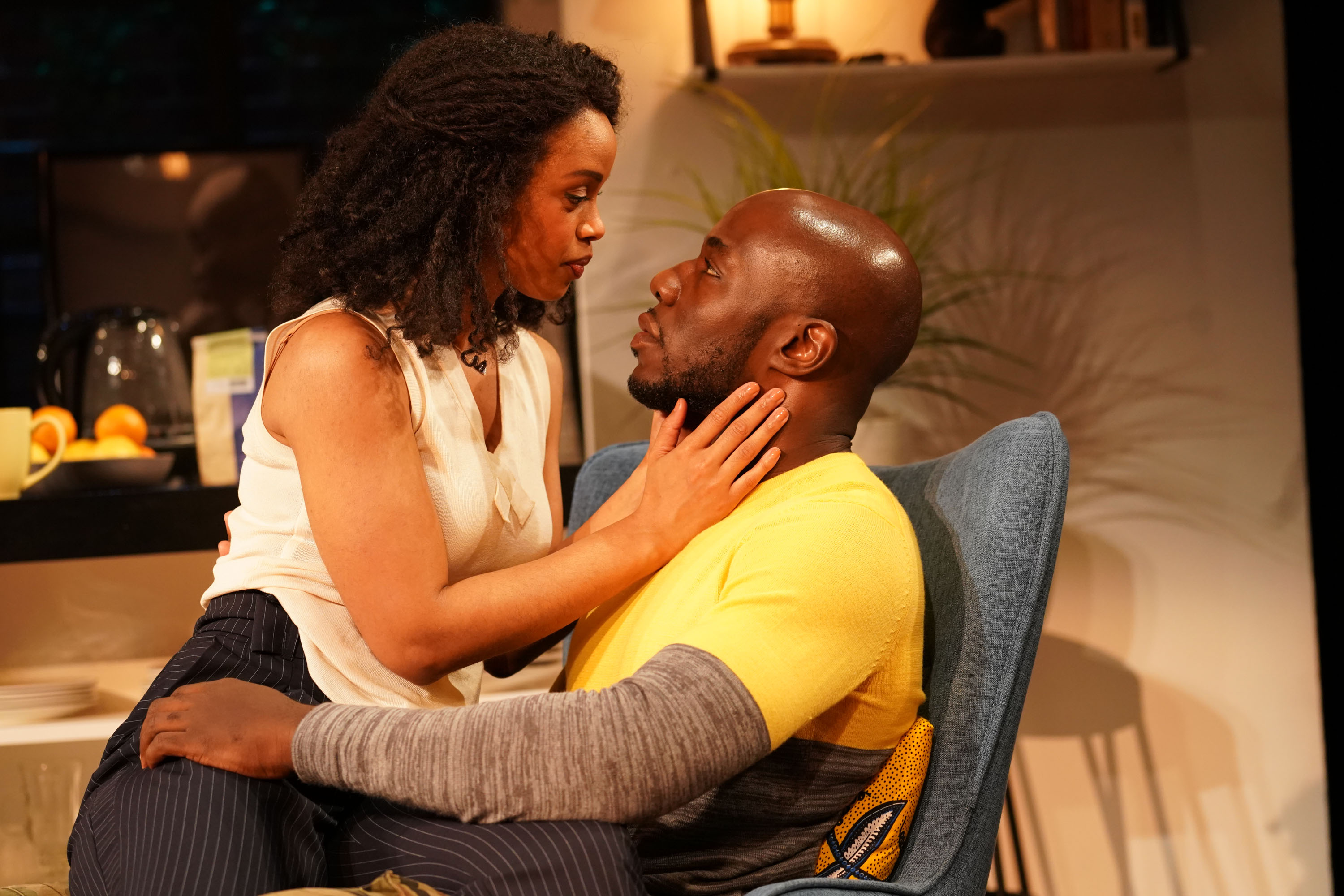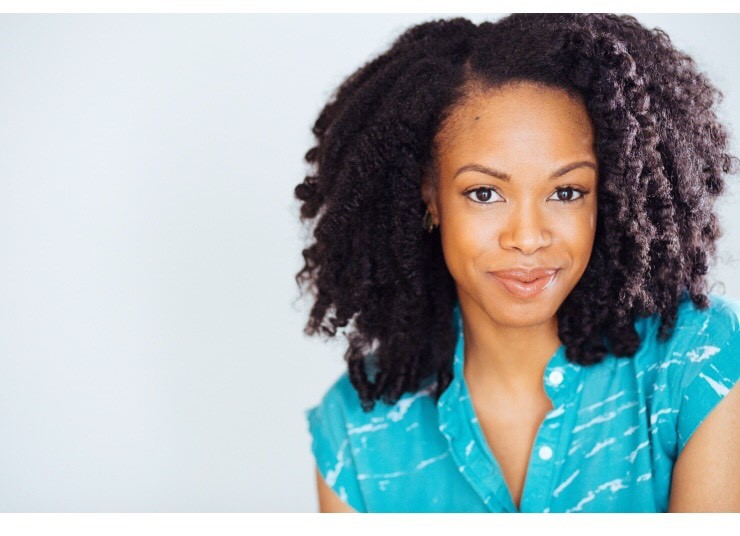In Loy A. Webb’s debut play, “The Light,” Mandi Masden plays half of a couple on the eve of their engagement. As the night unfolds, the conversation becomes explosive, revealing that sexual assault and its torrential aftermath has occurred in both of their lives.
“A Midsummer Night’s Dream,” “Jitney,” “The Piano Lesson,” and “Saint Joan” are among Masden’s other stage credits. She’s also appeared in “Law & Order: Special Victims Unit,” “Madam Secretary,” and “The Knick.”
We talked to Masden about her role in “The Light,” her collaboration with Webb and the show’s director, Logan Vaughn, and the play’s exploration of race, gender, and sexual violence.
“The Light” is playing at the MCC Theater in New York through March 17.
W&H: What’s it like to be a woman in theater today, particularly in a New York theatrical season featuring more writers of color and women than perhaps ever before?
MM: In many ways, it’s exciting, especially since we’re seeing an influx of new writers and new playwrights. I think we’re seeing stories about women that we haven’t seen before through a lens that we don’t often get to experience. Stories about women playing central characters are getting more complex, more complicated, more dimensional, and deeper. Different types of stories are being told, which is very, very exciting.
It’s also complicated as a woman of color, because you still feel sometimes that you are being pigeonholed or marginalized. Often in plays that involve people of color, the roles are not as thought through and thorough as you would hope.
But in general, for me as a woman, it is very exciting to be an actress in this moment, where women’s voices are now being amplified. You can feel that a lot of theaters are leaning into that right now.
W&H: “The Light” feels particularly relevant now. It’s sending out a very powerful message on the impact of sexual assault. You were in the play “Saint Joan” last year, which also had a very powerful message. Do you choose your roles with a sense of social relevance in mind?
MM: I try to. Sometimes you don’t always get that option, but when I’m afforded one, I try to choose work that is relevant to me or that I find very interesting. I’m also glad to find work in a piece that I feel will forward or highlight a conversation that I don’t feel we are having collectively. I try to choose pieces that speak to me in that way.
W&H: “The Light” is a very deep exploration of relationships and sexual assault and the havoc it places on women. What were your initial thoughts when you received the script?
MM: When I first got the script, I was very excited. Actually, I had only gotten the sides from the audition. One particular side was exactly like a fight I had with my boyfriend a few months prior, and that is what drew me so much to this piece. I thought, “Wow, there’s so much truth and complexity and depth in this.” This is a conversation I had had not only with my boyfriend, but with other women and other men of color. It was just so amazing to see that reflected in this piece. The play resonated so much with me as a woman, as a black woman, and in my own interactions with other people. That doesn’t happen all the time, so it’s very exciting to see this little snippet of truth that fell out of this show.

“The Light”: MCC Theater
W&H: How do you get inside your character Genesis’ head before each performance? It must be such an intense experience. Please talk about her evolution as the play unfolds.
MM: It is intense. I feel like Genesis, for the most part, is someone who has everything pretty much together. She’s a very organized, very deliberate, very passionate person. She has this job that she loves and is good at. She also has this wonderful relationship with this man that she loves very much and they share a very palpable bond and connection and deep love and understanding.
At the top of the show, we see her going through her everyday and she’s very put together and collected. As the play goes on, we see her starting to fray a bit. She has compartmentalized a lot of things and disassociated a lot of things she has to now deal with, in terms of herself and her partner. Without spoiling for people who haven’t seen the play, that’s the ride that we’re on.
W&H: The storyline involving Brett Kavanaugh adds a real sense of the here and now to the play. Where were you when you found out that he was confirmed?
MM: I was watching it at the laundromat. When I heard about the confirmation, I was on the train and got an update on my phone. I honestly remember not being surprised. I was disappointed, but not surprised.
The addition of Kavanaugh in the script was very new because our playwright, Loy A. Webb, wrote the script two years ago. We then had a different example of the Kavanaugh situation. He was a boxer and the students at Genesis’ school were huge fans of this boxer and she didn’t know how to tell them that he had assaulted women. She wanted them to strive for better examples of what it is to be loving and open and honest in black men.
With the Kavanaugh situation, Loy saw a more urgent example of how to have this conversation with Rashad [Genesis’ partner]. I think it was a wonderful and timely addition. It’s effective in terms of pointing out flaws and logic and hypocrisy on his end.
W&H: Can you please talk about your collaboration with Loy Webb and director Logan Vaughn?
MM: We have an incredible team of people. Logan is spectacular in creating an environment that allows for an effortless collaboration and freedom of feedback and reaction and response that you don’t always find in a rehearsal room. She sets the tone for this very open and free-flowing way of working. It was a very open collaborative process. Sometimes she’d be open to hearing feedback from us and agree to change it, or leave as-is. It was a rare experience.
W&H: From #MeToo to #BlackLivesMatter, “The Light” plays host to a number of issues, but what’s really at the core of Webb’s play is the eternal battle of the sexes between Rashad and Genesis. What is your working relationship like with McKinley Belcher III, who plays Rashad?
MM: McKinley, my co-star, is wonderful. He often says, during talkbacks and discussions, that working on this play allowed him as a man — because the playwright is a black woman, the director is a black woman, and I’m a black woman — to sit with powerful black women and be quiet and listen. He says he’s learned so much about the experience of black women, about our journeys, about how so much of what has happened to us is similar. He always talks about how much of a revelation it was in many ways to be a black man in the room, to just be silent and listen.
W&H: I know that your heart lies in the theater. Who are some female playwrights that inspire you?
MM: I think right now there are honestly a number of black female playwrights that I’m inspired by. Some of them haven’t been produced yet, but I’ve worked with them in readings or workshop productions of their works. I’m very excited about their presence or incoming presence in the theater scene — not only because it gives me physical work to do but it’s so great to finally get to a point where we are seeing an influx of black female writers. Dominique Morisseau, Jocelyn Bioh, Danai Gurira, Katori Hall, Erika Dickerson-Despenza, and Tori Sampson are some of the women who inspire me. As a black woman, even if I’m not in one of their shows, I know I will see black women reflected in a way I have not seen.







